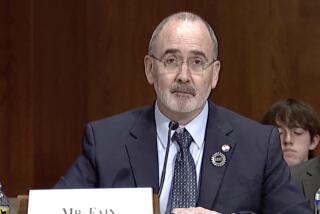What Those Long Work Hours May Mean About Your Home Life
- Share via
Are Americans putting in long work days because they feel they have to--or because they want to?
The notion that many Americans, perhaps one-fifth of all full-time workers, keep long work hours because they find their jobs more rewarding than their home lives is central to a much talked-about new book by sociologist Arlie Russell Hochschild titled “The Time Bind” (Metropolitan Books).
To assess Hochschild’s notion, Times staff writer Stuart Silverstein interviewed various workplace experts and observers. They were divided on many issues, even on the question of how many more hours workers put in today than in years past. Excerpts of the interviews follow:
*
Ellen Galinsky, president of the Families & Work Institute, a research organization:
“Some people are working longer hours because there still is a culture that says presence equals productivity. Other people are working longer hours because they’re worried about downsizing. Some people are working longer hours because they love their work and they’re really committed to it.
“This book wouldn’t have caught on if there weren’t some element of truth. This book is forcing us to hold up a mirror to ourselves and ask the hard question, ‘Are we deluding ourselves when we say we have to stay at work? Do we really wish we were at home?’ We find in our surveys that 66% of adults say they don’t spend enough time at home with their children. So are people not spending enough time with their children because it’s easier not to or because they can’t?
“If you’re going through the illness of a family member or a kid rebelling and it’s really hard to be at home, you do like to escape wherever you can. . . . Having something [such as work] that absorbs you sometimes is not a bad idea when life is complex and hard.”
*
Edward E. Potter, president of the Employment Policy Foundation, a business-backed research group:
Potter maintains that the best government statistics available, while inconclusive, suggest that full-time workers are putting in only slightly more hours on the job than they did in 1970. He says a much more significant change that has made people “feel this time pressure and feel that they, in fact, may be working harder and longer” is the shift to the dual-wage-earner family.
“If you were to look at the work force in 1940, what you would find is that the traditional male- earner household was 68% of the work force and dual-earner households were about 10%. Today, what you find is that the traditional one male- earner household is about 16% of the work force, but the dual-earner household is 41%. So the time crunch comes because the infrastructure at home has been lost as, increasingly, two members of the household work.”
*
Juliet B. Schor, economist and author of the 1992 book “The Overworked American”:
Schor contends that the average American worker’s hours on the job have risen substantially since 1969, by 10%, based on her interpretation of U.S. census data. She says that much of that increase has come because “employers have become more demanding. Success--in career jobs or in just earning enough money to get a decent standard of living from lower-paid hourly jobs--requires more hours of work today than it did 15 years ago or 25 years ago.
“If you think about what’s happening in workplaces because of increased global competition, technical change and downsizing, what you see is that companies are producing more with fewer people, and it’s not only technological change that’s responsible. It’s also because companies have cut staff and are requiring a smaller number of workers to do more.
“Hochschild is saying that the company she studied had a workaholic corporate culture in which long hours were necessary for success and that bucking that culture rings a death knell for one’s career. At the same time, there are significant numbers of employees who internalized and adopted those workaholic norms and who, partly as a result of those norms and partly to escape difficult family situations, lived workaholic lifestyles.”
Sara Horowitz, executive director of Working Today, a New York-based worker advocacy and service group:
“The nature of work is changing so much, with people telecommuting, being self-employed or switching jobs frequently, that work and family life are blending into one another and the boundaries just aren’t as clear as they used to be. So, to say simply that people are working longer because they want to and would rather be there than at home, I think, misses the complexity of what’s happening.
“In the 1950s, people maybe had this sense of this ‘Ozzie and Harriet’ life. You work 9 to 5, you come home, and that’s family time. That’s really not the reality of the ‘90s. Work can be at 9 o’clock at night after you’ve put your children to bed and you suddenly have to do a few more things.”
Times staff writer Stuart Silverstein can be reached by phone at (213) 237-7887 or by e-mail at [email protected]
More to Read
Sign up for our Book Club newsletter
Get the latest news, events and more from the Los Angeles Times Book Club, and help us get L.A. reading and talking.
You may occasionally receive promotional content from the Los Angeles Times.








